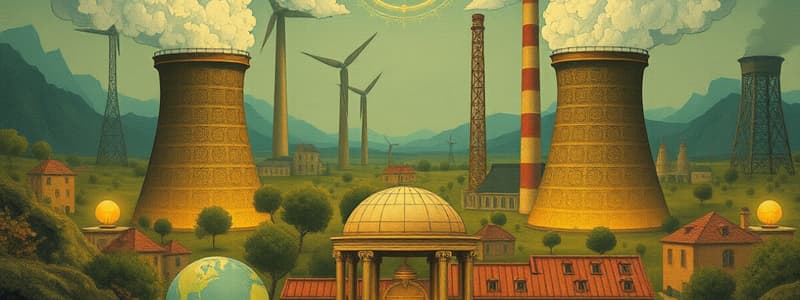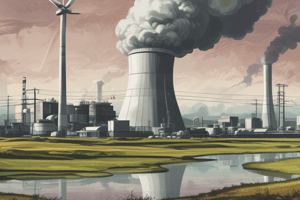Podcast
Questions and Answers
Nuclear power plants produce no dangerous solid waste.
Nuclear power plants produce no dangerous solid waste.
False (B)
Using nuclear power avoids the release of greenhouse gases.
Using nuclear power avoids the release of greenhouse gases.
True (A)
Describe two environmental problems that could result from the construction of a nuclear power plant.
Describe two environmental problems that could result from the construction of a nuclear power plant.
Habitat or riparian area destruction/fragmentation at the construction site and disruption of habitat caused by the installation of power lines.
Identify the most likely pollution threat from a nuclear power plant being built on a river.
Identify the most likely pollution threat from a nuclear power plant being built on a river.
Identify potential ecological consequences of thermal pollution.
Identify potential ecological consequences of thermal pollution.
Identify a system often used in nuclear power plants to reduce thermal pollution.
Identify a system often used in nuclear power plants to reduce thermal pollution.
Describe two specific steps that residents or businesses could take to reduce electricity consumption.
Describe two specific steps that residents or businesses could take to reduce electricity consumption.
Identify a specific nuclear power plant at which a major accident has occurred and explain one environmental consequence.
Identify a specific nuclear power plant at which a major accident has occurred and explain one environmental consequence.
Identify two specific pollutants in storm-water runoff that degrade the quality of surface water.
Identify two specific pollutants in storm-water runoff that degrade the quality of surface water.
Describe two ways that the volume of storm-water runoff can be reduced.
Describe two ways that the volume of storm-water runoff can be reduced.
Describe one environmental problem that results from having extensive paved areas.
Describe one environmental problem that results from having extensive paved areas.
Describe what happens when two tectonic plates collide along a subduction zone.
Describe what happens when two tectonic plates collide along a subduction zone.
Explain how subduction leads to volcanic activity.
Explain how subduction leads to volcanic activity.
What is primary succession?
What is primary succession?
Explain how primary succession can lead to soil formation on a newly formed volcanic landscape.
Explain how primary succession can lead to soil formation on a newly formed volcanic landscape.
Flashcards are hidden until you start studying
Study Notes
Nuclear Power and Environmental Impacts
- Nuclear power plants do produce radioactive wastes that must be stored safely for extended periods.
- Utilizing nuclear power eliminates emissions of greenhouse gases due to the lack of fossil fuel combustion.
- Construction of nuclear power plants can lead to significant habitat destruction and fragmentation, especially in crucial riparian areas.
- Installation of power lines during construction disrupts local habitats.
Pollution and Thermal Effects
- A major environmental pollution threat from nuclear facilities built near rivers is thermal pollution, which can alter local aquatic ecosystems.
- Thermal pollution negatively impacts the environment by decreasing dissolved oxygen levels (DO) in the water.
Mitigation Strategies
- Cooling ponds and canals are utilized in nuclear power plants to help manage and reduce thermal pollution.
- Residents can lower electricity consumption through measures such as upgrading to energy-efficient appliances and replacing incandescent bulbs with CFLs or LEDs.
Case Studies of Nuclear Accidents
- The Chernobyl disaster resulted in severe environmental consequences, including the emergence of cancerous tumors in animals and the death of various plant and animal species.
Storm Water Management
- Common pollutants in storm-water runoff that diminish surface water quality include nitrates and phosphates.
- Storm-water runoff can be mitigated by creating retention basins or ponds and increasing tree and vegetation coverage to enhance natural infiltration and absorption of water.
Urbanization and Biodiversity
- Extensive paved areas lead to environmental issues such as habitat destruction and a loss of biodiversity due to the removal of native vegetation.
Tectonic Plate Dynamics
- When two tectonic plates collide at a subduction zone, one plate is forced beneath the other.
- This subduction process contributes to volcanic activity, as the descending plate melts, generating molten material and magma, which can rise to the surface.
Ecosystem Development
- Primary succession involves the gradual establishment of plant and animal life in areas devoid of topsoil.
- On newly formed volcanic landscapes, primary succession fosters soil development through the breakdown of rocks and accumulation of organic matter over time.
Studying That Suits You
Use AI to generate personalized quizzes and flashcards to suit your learning preferences.




